Rev Martin Luther King Jr
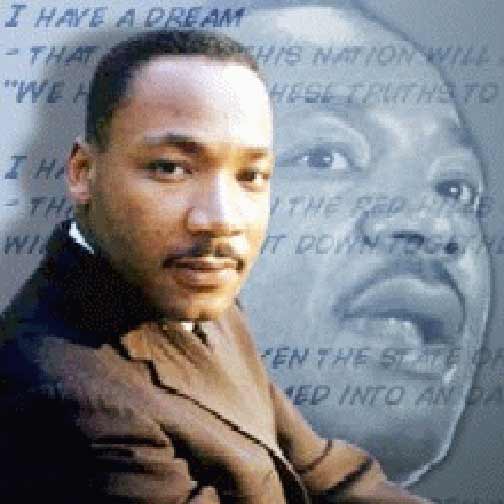
The Reverend Martin Luther King, Jr., Ph.D
Born January 15, 1929
Assassinated April 4, 1968
"The ultimate weakness
of violence
is that it is a descending spiral,
begetting the very thing it seeks to destroy.
Instead of diminishing evil, it multiplies it.
Through violence you may murder the liar,
but you cannot murder the lie, nor establish the truth.
Through violence you murder the hater,
but you do not murder hate.
In fact, violence merely increases hate....
Returning violence for violence multiples violence,
adding deeper darkness to a night already devoid of stars.
Darkness cannot drive out darkness; only light can do that.
Hate cannot drive out hate; only love can do that."
Dr. Martin Luther King Jr.
The Reverend Martin Luther King, Jr., Ph.D. (January 15, 1929 – April 4, 1968) was a Nobel Laureate, Baptist minister, and African American civil rights activist. He is one of the most significant leaders in U.S. history and in the modern history of nonviolence, and is considered a hero, peacemaker and martyr by many people around the world.
Contents
1 Civil rights activism
2 A controversial new call
3 Assassination
4 Legacy
5 King and the FBI
6 External links
7
Martin Luther King Downloads (Video and Audio)
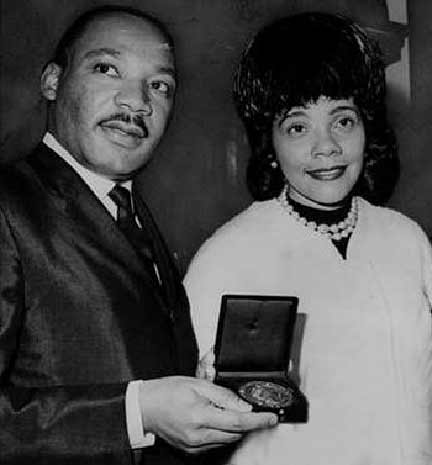
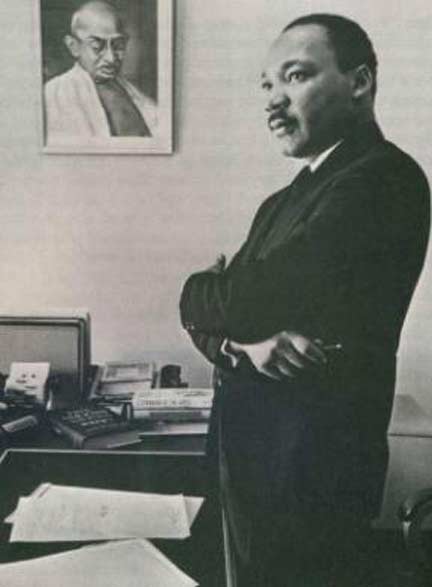
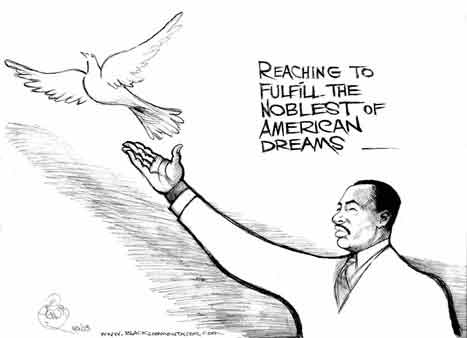
In 1954, King became the pastor of the Dexter Avenue Baptist Church in Montgomery, Alabama. He was a leader of the 1955 Montgomery bus boycott which began when Rosa Parks refused to cede her seat to a white person. The boycott lasted for 362 days. The situation became so tense that King's house was bombed. King was arrested during this campaign, which ended with a United States Supreme Court decision outlawing racial segregation on intrastate buses.
Following the campaign, King was instrumental in the founding of the Southern Christian Leadership Conference (SCLC) in 1957, a group created to organize Civil Rights activism. He continued to dominate the organization to his death, a position criticized by the more radical and democratic Student Nonviolent Coordinating Committee (SNCC). The SCLC derived its membership principally from black communities associated with Baptist churches. King was an adherent of the philosophies of nonviolent civil disobedience used successfully in India by Mohandas Gandhi, and he applied this philosophy to the protests organized by the SCLC. King correctly identified that organized, non-violent protest against the racist system of Southern separation known as Jim Crow, when violently attacked by racist authorities and covered extensively by the media, would create a wave of pro-Civil Rights public opinion, and this was the key relationship which brought Civil Rights to the forefront of American politics in the early 1960s. King is perhaps most famous for his "I Have a Dream" speech, given in front of the Lincoln Memorial during the 1963 March on Washington for Jobs and Freedom
He organized and led marches for the right to vote, desegregation, fair hiring, and other basic civil rights. Most of these rights were later successfully enacted into United States law with the passage of the Civil Rights Act of 1964 and the Voting Rights Act of 1965.
King and the SCLC applied the principles of nonviolent protest with astonishing success by choosing the method of protest, and the places in which protests were carried out, in order to provoke the harshest and most shocking retaliation from racist authorities. King and the SCLC were instrumental in the unsuccessful protest movement in Albany in 1961–1962, where splits within the black community and the canny, low-key response by local government defeated the movement, in the Birmingham protests in the summer of 1963, and in the protest in St. Augustine, Florida in 1964. King and SCLC joined SNCC in the city of Selma, Alabama in December 1964; SNCC had already been there working on voter registration for a number of months.
King and SCLC, in partial collaboration with SNCC, then attempted to organise a march which was intended to go from Selma to the state capital Montgomery starting on March 25, 1965. The first attempt to march, on March 7, was aborted due to mob and police violence against the demonstrators. The day has since become known as Bloody Sunday. Bloody Sunday was a major turning point in the effort to gain public support for the Civil Rights movement, the clearest demonstration so far of the dramatic potential of King's techniques of nonviolence. King, however, was not present; after meeting with President Lyndon B. Johnson, he had attempted to delay the march until March 8, and the march was carried out against his wishes and without his presence by local civil rights workers. The footage of the police brutality against the protestors was broadcast extensively across the nation, and aroused a national sense of public outrage.
The second attempt at the march, on March 9, was ended when King stopped the march at the Edmund Pettus Bridge on the outskirts of Selma, an action which he seemed to have negotiated with city leaders beforehand. This unexpected action aroused the surprise and anger of many within the local movement. The march finally went ahead fully on March 25, with the agreement and support of President Johnson, and it was during this march that Willie Ricks coined the phrase "Black Power" (widely credited to Stokely Carmichael).
King was instrumental in the organization of the March on Washington for Jobs and Freedom in 1963. This role was another which courted controversy, as King was one of the key figures who helped President John F. Kennedy change the intent of the march. Conceived as a further part of the Civil Rights protest, it became more of a celebration of the achievements of the movement—and the government—so far, a development which angered activists who were more radical than King.
King wrote and spoke frequently, drawing on his long experience as a preacher. His "Letter from Birmingham Jail", written in 1963, is a passionate statement of his crusade for justice. On October 14, 1964, King became the youngest recipient of the Nobel Peace Prize, which was awarded to him for leading non-violent resistance to end racial prejudice in the United States.
Starting in 1965, King began to express doubts about the United States' role in the Vietnam War. On April 4, 1967— exactly one year before his death— King spoke out strongly against the US's role in the war, insisting that the US was in Vietnam "to occupy it as an American colony" and calling the US "the greatest purveyor of violence in the world today." But he also argued that the country needed larger moral changes:
A true revolution of values will soon look uneasily on the glaring contrast of poverty and wealth. With righteous indignation, it will look across the seas and see individual capitalists of the West investing huge sums of money in Asia, Africa and South America, only to take the profits out with no concern for the social betterment of the countries, and say: "This is not just." [1] (http://www.hartford-hwp.com/archives/45a/058.html)
King was long hated by many white southern segregationists, but this speech turned the more mainstream media against him. TIME called the speech "demagogic slander that sounded like a script for Radio Hanoi [a propaganda radio station run by the North Vietnamese Army during the Vietnam War]", and the Washington Post declared that King had "diminished his usefulness to his cause, his country, his people."
The speech was a reflection of King's evolving political advocacy in his later years. He began to speak of the need for fundamental changes in the political and economic life of the nation. Toward the end of his life, King more frequently expressed his opposition to the war and his desire to see a redistribution of resources to correct racial and economic injustice. Though his public language was guarded, so as to avoid being linked to communism by his political enemies, in private he sometimes spoke of his support for democratic socialism [2] (http://balder.prohosting.com/jerryku/redrom/mlk.html)):
You can't talk about solving the economic problem of the Negro without talking about billions of dollars. You can't talk about ending the slums without first saying profit must be taken out of slums. You're really tampering and getting on dangerous ground because you are messing with folk then. You are messing with captains of industry.... Now this means that we are treading in difficult water, because it really means that we are saying that something is wrong... with capitalism.... There must be a better distribution of wealth and maybe America must move toward a democratic socialism. (Frogmore, S.C. November 14, 1966. Speech in front of his staff.)
In 1968, King and the SCLC organized the "Poor People's Campaign" to address issues of economic justice. The campaign culminated in a march on Washington, D.C. demanding economic aid to the poorest communities of the United States.
On April 3, 1968, King prophetically told a euphoric crowd:
It really doesn't matter what happens now.... some began to... talk about the threats that were out -- what would happen to me from some of our sick white brothers.... Like anybody, I would like to live a long life. Longevity has its place, but I'm not concerned about that now. I just want to do God's will. And He's allowed me to go up to the mountain. And I've looked over, and I've seen the Promised Land. I may not get there with you. But I want you to know tonight, that we, as a people, will get to the Promised Land. And so I'm happy tonight. I'm not worried about anything. I'm not fearing any man. Mine eyes have seen the glory of the coming of the Lord.
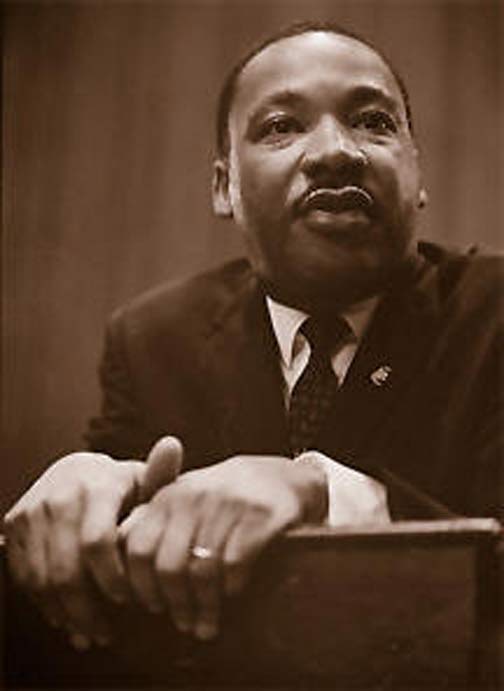
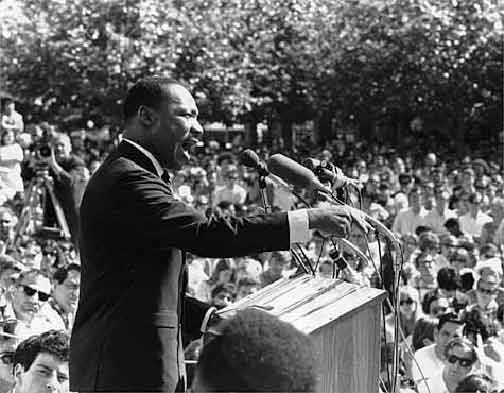
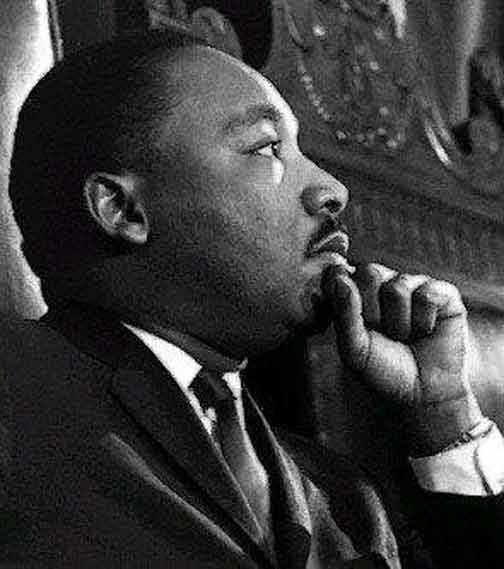
King was assassinated the next morning, April 4, 1968, on the balcony of the Lorraine Motel in Memphis, Tennessee, while preparing to lead a local march in support of the heavily-black Memphis sanitation workers' union. Friends inside the apartment heard the shot fired and ran to the balcony to find King shot in the jaw. He was pronounced dead several hours later.
James Earl Ray confessed to the shooting and was convicted, though he recanted his confession days later. In 1999, Coretta Scott King, King's widow (also a civil rights leader), along with the rest of King's family won a wrongful death civil trial against Loyd Jowers, who claimed to have received $100,000 to arrange King's assassination. The jury of six whites and six blacks found that "governmental agencies were parties" to the assassination plot.(http://www.ratical.org/ratville/JFK/WFPonMLK.pdf)
Rev. Jesse Jackson, who was with King at the time of his death, noted "The fact is there were saboteurs to disrupt the march. [And] within our own organization, we found a very key person who was on the government payroll. So infiltration within, saboteurs from without and the press attacks. ... I will never believe that James Earl Ray had the motive, the money and the mobility to have done it himself. Our government was very involved in setting the stage for and I think the escape route for James Earl Ray."
Since his death, King's reputation has grown to become one of the most revered names in American history to the point where he is compared with Abraham Lincoln. Supporters of this idea remark that both were leaders credited with strongly advancing human rights against poor odds in a nation divided against itself on the issue - and were assassinated in part for it. Even posthumous accusations of marital infidelity and academic plagiarism have not seriously dented his public esteem, but merely reinforced the image of a very human hero and leader.
In 1980, King's boyhood home in Atlanta and several other nearby buildings were declared as Martin Luther King, Jr. National Historic Site. In 1986, a U.S. national holiday was established in honor of Martin Luther King Jr., which is called Martin Luther King Day. It is observed on the third Monday of January each year, around the time of King's birthday. On January 18, 1993, for the first time, Martin Luther King Day was officially observed in all 50 U.S. states. In addition, many U.S. cities have officially renamed one of their streets to honor King.
Since his death, Coretta Scott King has followed her husband's footsteps as a civil rights leader. Her children are also following their father's footsteps.
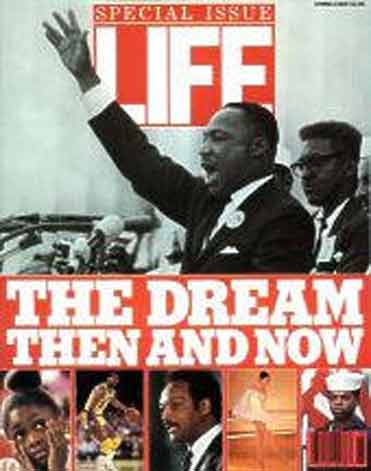
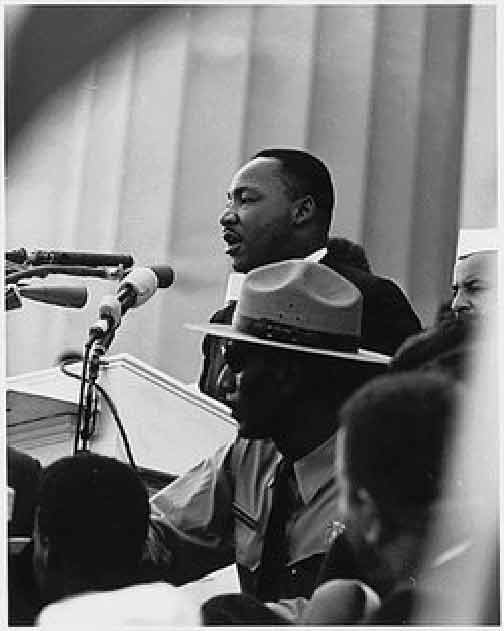
King had a mutually antagonistic relationship with the Federal Bureau of Investigation (FBI), especially its director, J. Edgar Hoover. The FBI began tracking King and the SCLC in 1961. Its investigations were largely superficial until 1962, when it learned that one of King's most trusted advisers was Stanley Levison. Levison was a man whom the bureau suspected of involvement with the Communist Party, USA, to which another key King lieutenant, Hunter Pitts O'Dell, was also linked by sworn testimony before the House Un-American Activities Committee (HUAC). The Bureau placed wiretaps on Levison and King's home and office phones, and bugged King's rooms in hotels as he traveled across the country. The Bureau also informed then-Attorney General Robert Kennedy and then-President John F. Kennedy, both of whom unsuccessfully tried to persuade King to dissociate himself from Levison. For his part, King adamantly denied having any connections to Communism, stating at one point that "there are as many Communists in this freedom movement as there are Eskimos in Florida"—to which Hoover responded by calling King "the most notorious liar in the country."
The attempt to smear King as a communist was in keeping with the feeling of many segregationists that blacks in the South were happy with their lot, but had been stirred up by "communists" and "outside agitators." Movement leaders countered that voter disenfranchisement, lack of education and employment opportunities, discrimination and vigilante violence were the reasons for the strength of the Civil Rights Movement, and that blacks had the intelligence and motivation to organize on their own.
HUAC later was discredited for its coercion of witnesses and the manner in which it sought to implicate individuals with vague and often sweeping accusations and assumptions of guilt by association. The Committee was renamed in 1969 and eventually abolished.
Later, the focus of the Bureau's investigations shifted to attempting to "discredit" King through revelations regarding his private life. The Bureau sent anonymous letters to King threatening to reveal information if he didn't cease his civil rights work.
Finally, the Bureau's investigation shifted away from King's personal life to intelligence and counterintelligence work on the direction of the SCLC and the Black Power movement.
January 31, 1977, in the cases of Bernard S. Lee v. Clarence M. Kelley, et al. and Southern Christian Leadership Conference v. Clarence M. Kelley, et al. United States District Judge John Lewis Smith, Jr., ordered that all known copies of the recorded tapes, and transcripts resulting from the FBI's microphonic surveillance of King, between 1963 and 1968, be sealed and made secret within the National Archives until the year 2027.
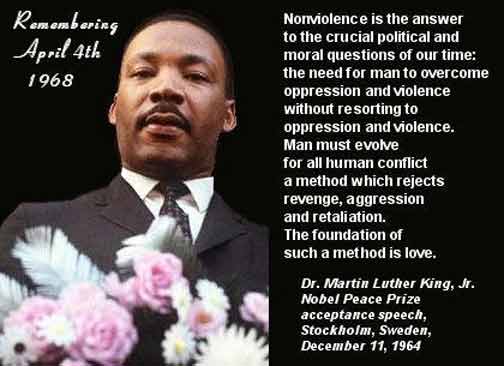
- The Martin Luther King, Jr. Papers Project (http://www.stanford.edu/group/King/)
- The Seattle Times: Martin Luther King Jr. (http://seattletimes.nwsource.com/mlk/)
- Winner of the 1964 Nobel Prize in Peace (http://www.nobelprizes.com/nobel/peace/1964a.html)
- Yerba Buena Gardens - Martin Luther King, Jr. Memorial (http://www.yerbabuenagardens.com/features/gardens.html#2)
- Microsoft Encarta Africana - Poor People's Campaign (http://balder.prohosting.com/jerryku/redrom/poor.html)
- I have a dream speech (http://www.mecca.org/~crights/dream.html)
- Bruderhof Peacemakers Guide profile on Martin Luther King Jr. (http://www.peacemakersguide.org/peace/Peacemakers/Martin-Luther-King-Jr.htm)
- Pamphlet on King and Socialism from the Socialist Party USA (http://www.sp-usa.org/literature/mlking-flyer.pdf) (PDF)
- MLK: The Red Reverend
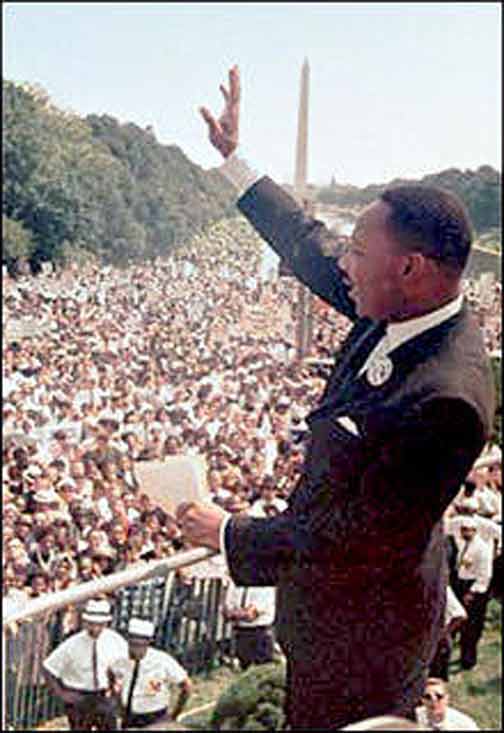
Martin Luther King: Beyond Vietnam -- A Time to Break Silence (MP3)
Martin Luther King: I had a dream (MP3)
Martin Luther King: His last public speech video (RAM)
The New Negro video (RM)

